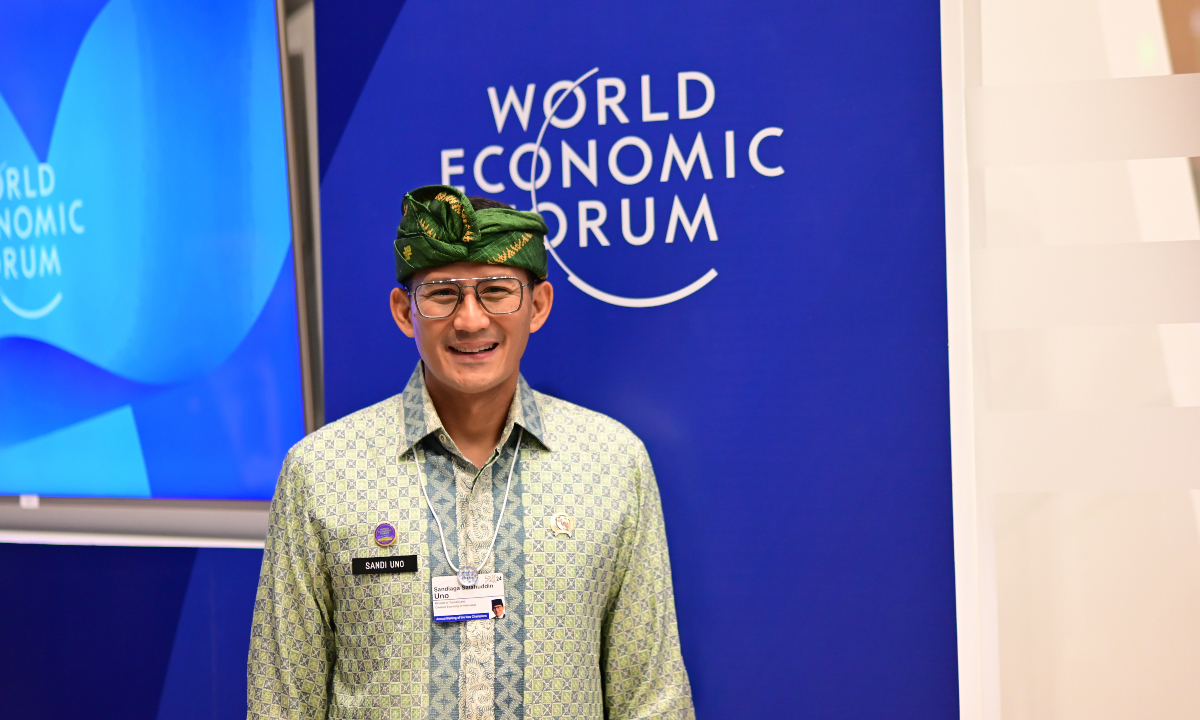
Minister of Tourism and Creative Economy of Indonesia Sandiaga Salahuddin Uno at the Summer Davos meeting in Dalian, Northeast China's Liaoning Province on June 25, 2024 Photo: Tao Mingyang/GT
Editor's Note:The trade volume between China and Indonesia has risen sharply and now exceeds $100 billion a year. China has been Indonesia's largest trading partner for 11 consecutive years and has ranked among Indonesia's top three sources of foreign investment for eight consecutive years. Additionally, the prospects for cooperation between the two countries in emerging industries, including new-energy vehicles, are promising. In terms of cultural exchanges, Indonesia has become one of the preferred destinations for an increasing number of Chinese tourists. Global Times (GT) reporter Yin Yeping recently interviewed Sandiaga Salahuddin Uno (Uno), minister of tourism and creative economy of Indonesia, who shared insights into how China and Indonesia can strengthen their ties. He also voices opposition to growing protectionism, advocating for cooperation and free trade.
GT: How do you view the prospects for Chinese economic development? In which area does Indonesia see the most potential?Uno: We have a very strong relationship with China. Over the last few decades, China and Indonesia have built robust ties, particularly in investment, trade, and tourism. The two countries cooperate extensively, from infrastructure projects and investment to critical minerals and energy, and even in enhancing our processing industries to create more value. We have a very strong relationship with China. Over the last few decades, China and Indonesia have built robust ties, particularly in investment, trade, and tourism. The two countries cooperate extensively, from infrastructure projects and investment to critical minerals and energy, and even in enhancing our processing industries to create more value.
An exciting development of our bilateral cooperation is the inauguration of the Jakarta-Bandung High-Speed Railway, the first of its kind in Indonesia. I am thrilled about this, because previously, it was unimaginable to reach Bandung from Jakarta in less than three hours. Now, we can travel between the two cities by train in just around 40 minutes.
I believe these ties will continue to strengthen. The economic prospects for both China and Indonesia are very bright.
GT: Last year, the Indonesian government said it was planning to launch a visa-free policy with a number of countries including China. How are things going now?Uno: We are nearing the final stages of this. We are working toward finalizing a visa-free policy for Chinese tourists visiting Indonesia, with the aim of completing it soon, hopefully before the end of this year.We are nearing the final stages of this. We are working toward finalizing a visa-free policy for Chinese tourists visiting Indonesia, with the aim of completing it soon, hopefully before the end of this year.
China is expected to contribute approximately 1.2 million tourists to Indonesia this year, making it a crucial market. I have been advocating for this with our fellow ministers, and it is now under final deliberation by our president. Hopefully, we will launch this initiative soon.
GT: Under the Belt and Road Initiative, in which Indonesia plays a very active role, what are the opportunities and potential for cooperation between China and Indonesia in emerging fields, such as green development and artificial intelligence?Uno: Digital transformation and the green economy are two sectors with immense potential. We are witnessing a shift toward blue and green circular economies, which require substantial investment and knowledge transfer. The electric vehicle (EV) ecosystem is another area where we see significant opportunities to collaborate with China.
In addition to high-speed trains, we also require other types of infrastructure and products, including new aircraft from China. This could potentially reduce the high airfare prices in Indonesia.
Currently, there are Chinese-made aircraft operating in Indonesia, and I have personally flown on one. I think that would be an opportunity for us to work together and create a lot of opportunities.
I think some of the big airlines in Indonesia are looking at the possibility of ordering more Chinese-made aircraft, and we at the Tourism and Creative Economy Ministry are pushing to get more aircraft and more seat availability in order for us to push down the price of traveling within the Indonesian archipelago.
My experience on the Chinese-made aircraft was very smooth, and with collaboration, maybe some parts of the aircraft could also be made in Indonesia. The collaboration could also extend to maintenance and repair operations in Indonesia, further enhancing our partnership.
GT: There have been some claims made by certain Western countries about an "overcapacity" issue with Chinese EVs, meaning they have decided to impose additional tariffs on the Chinese EVs. How do you respond to this development?Uno: I have tried Chinese-made EVs, and they have very good quality. Right now, the EV prices in Indonesia are quite high, but some Chinese manufacturers have already started distributing EVs here, which may help to reduce the prices.
I don't think we're facing issues of overcapacity; rather, our focus should be on how the EV ecosystem can benefit both countries. If we can establish manufacturing capacity in Indonesia, as some manufacturers are already doing, it will be advantageous for both Indonesia and China.
I believe having more cooperation, rather than closing off trade, will benefit consumers. Our goal should be to attract more investment and to implement policies that encourage job creation.
In my view, we should work closer together, foster inclusivity, and increase cross-border trade and investment for the benefit of our two nations.




